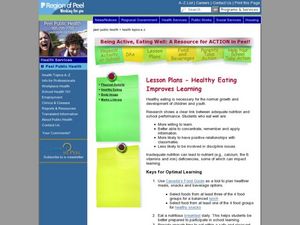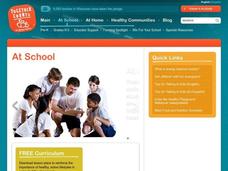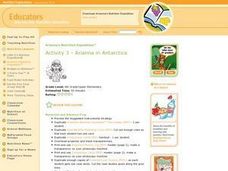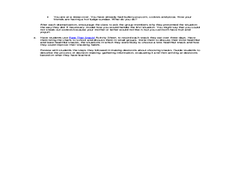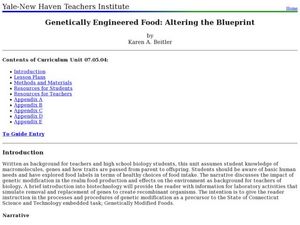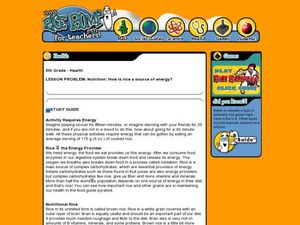Curated OER
Healthy Eating Improves Learning
Students recognize that healthy food gives you better ability to concentrate and makes you more willing to learn. In this healthy food lesson, students choose food from Canada's food guide to create a healthy lunch and healthy snack.
Curated OER
Why is Rice Good for Us?
Third graders explore why rice is good for our bodies. In this nourishment lesson, 3rd graders review the food pyramid and discuss serving sizes. Students discuss the different ways rice is used in food. Students use uncooked rice to...
Curated OER
Digestion and Nutrition
Debunk the theory that a soda-and-candy diet is a nutritionally sound concept! Learners first read 2 paragraphs of background information covering essential nutrients, digestion, and homeostasis. Then, they use the information they...
Curated OER
Food Label Analysis
Encourage healthy eating and demonstrate how to read a food label with this worksheet. Class members choose a food and respond to fill in the blank questions regarding calories, daily values, and ingredients. Each individual decides, by...
Curated OER
Energy Plus!
This lesson plan seems pretty advanced for K-2nd graders, but there are some pieces that can be used with young learners. Look through this comprehensive, fact-filled lesson plan and pull out information and activities that you can adapt...
Curated OER
Reading & Using a Nutrition Label
Students discover the importance of healthy eating. Using food nutrition labels, they read and examine the nutritional value. Students collect the data on a spreadsheet and create a graph. They analyze the media influences on product...
Curated OER
4th Grade Food Safety Lesson
From a high-speed hand-washing lesson to identifying important nutrients in fruits and veggies, this resource has several activity ideas and worksheets for teaching food safety to your learners.
Curated OER
Diet Evaluation Project
Students record two consecutive days of food intake. They identify which nutrients are below 70%. They compare diet composition between protein, fats, and carbohydrates. They evaluate fat in the diet to fall below the American Cancer...
Southern Nevada Health District
Is It Fruit?
The concept is the most valuable feature of this resource, which is designed to bring learners' attention to the nutritional labels of food items. Your class will take a closer look at the labels on bottled juice containers to determine...
Curated OER
Arianna in Antarctica
Fourth graders review their knowledge of the food groups and their benefits. They make comparison flash cards with different foods and their benefits, sharing them in creative ways. Finally, they work in groups to solved case studies...
Curated OER
A Funky Healthy Life Style!
Students name the five food groups and classify foods according to group. They tell how proteins, carbohydrates, vitamins/minerals, and water help their body. Students discuss how play and exercise can help their body.
Curated OER
Understanding Food Labels
Young scholars determine the number of calories, serving size, and vitamins and minerals in different food products and use this information to create a formula determining the number of calories per serving size and the daily...
Curated OER
Anatomy
Fourth graders describe how health behaviors affect body systems, and describe the basic function of major body systems.
Curated OER
Eat Your Sprouts Part I
Pupils will conduct a lab on the oxidation of an apple. The students will learn that the oxidation process can be halted when lemon juice is applied to the flesh of an apple because the lemon juice contains vitamin C, an antioxidant....
Curated OER
Get Nutty
Students research how nuts and seeds contribute to their overall good health.They recognize that nuts and seeds are a tasty addition to a meal. Students comprehend that nuts and seeds pose a risk for a small proportion of the population...
Curated OER
Mystery Fruits and Vegetables: Why They Are Important to Us
Students discover the importance of eating fruits and vegetables. In this health lesson, students participate in a guessing game, trying to identify fruits and vegetables without seeing them. Students discuss the importance of a well...
Curated OER
Fat - A Concentrated Energy Source
The role of fat as a nutrient that provides a source of concentrated energy and is also necessary for the body to utilize other nutrients, namely some important vitamins.
Curated OER
How Do You Choose Snacks and Other Foods?
Students discuss peer pressure pertaining to healthy eating decisions. In this personal health lesson, students identify reasons why they make poor eating decisions and how to ignore food temptations. Students complete the "Rate That...
Curated OER
Genetically Engineered Food: Altering the Blueprint
Students explore the genetic engineering of food. In this health instructional activity students explain how DNA technology can be used to produce food.
Curated OER
They Don't Just Eat Grass
Learners consider the USDA daily recommendations to create a "feed" product for middle schoolers. In this Health lesson, students learn about the ingredients in feed that is fed to livestock and apply the method to creating feed rations...
Howard Hughes Medical Institute
Molecular Structure of Fat
Bad fat, good fat, trans fat, food fat—are all fats created equal? Get to the bottom of the types of fat with a well-crafted presentation. The resource covers adipose tissue, lipids, trans fats, and many other substances that fall under...
Curated OER
Meal Planning
Students study the nutrients found in foods and the food pyramid. In this investigative lesson students will plan a seven day menu built around the food pyramid.
Curated OER
Rice as a Source of Energy
Fifth graders investigate the nutrition in rice. In this rice lesson, 5th graders discover that rice is a great source of energy. Students compare foods to rice to see the differences in the nutritional value. Students classify foods in...
Curated OER
Micronutrient Need Intervention
High schoolers investigate the real world applications of nutrition. They study the problem of starvation and how it affects different populations. Students work in small groups in order to devise and intervention plan. They also search...


